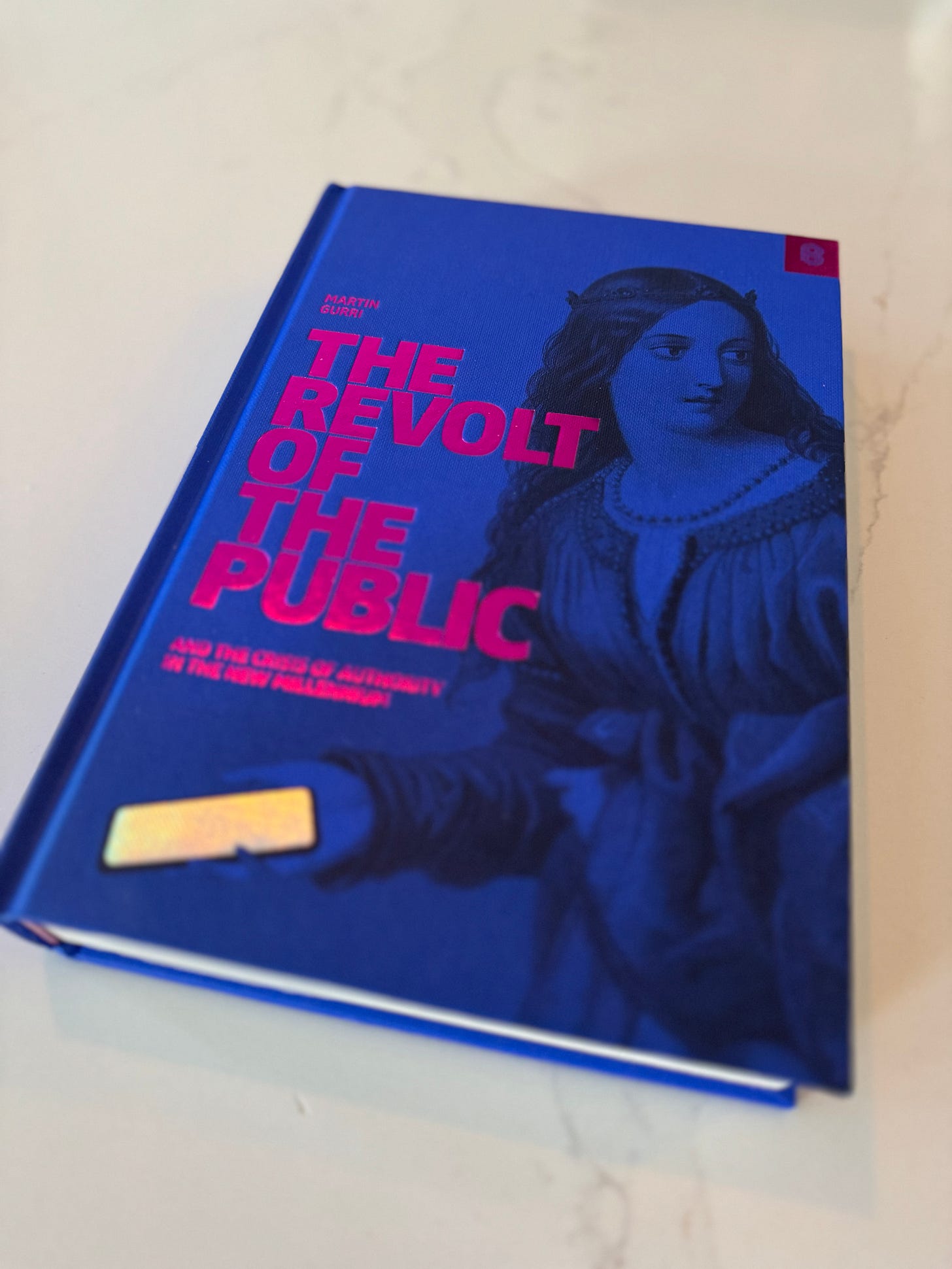Trust Collapsed, Now What? The Book That Makes Sense of Our Digital Chaos
How Martin Gurri's "Revolt of the Public" explains why outrage dominates and institutions fail
Have you ever read something that completely reframes how you view the world? Martin Gurri's The Revolt of the Public did exactly that for me. It wasn't just thought-provoking—it gave me an entirely new vocabulary to understand what's happening around us.
Gurri's central idea is simple yet profound: institutional authority is collapsing, and nobody has figured out what comes next. We're living through a messy transition where distrust isn't just a political talking point, it's become the default setting in how we relate to everything.
"The authority of every governing institution, from the presidency to the police, from Congress to the courts, has been steadily ebbing away."
What I found fascinating was Gurri's description of "the public" not as some unified entity but as this volatile, networked force that's incredibly good at tearing things down, but struggles to build anything lasting. Think about movements like Occupy Wall Street or even Anonymous. They could mobilize massive energy against institutions, but what happened afterward? Not much that was concrete.
This brings us to what Gurri calls the center-versus-edge dynamic. Traditionally, institutions (the center) filtered information, established cultural norms, and provided stability. Now, thanks to digital tools, the edges of society can challenge and sometimes overwhelm the center instantly. However the downside is that there's no shared method for replacing what gets destroyed.
"The information sphere has been overturned. Information flows horizontally now, among amateurs, rather than vertically, from institutions to the public."
It's not that people are inherently destructive. It's that the internet gives everyone the feeling of expertise without requiring actual expertise. We used to get information through channels that demanded some level of gatekeeping and rigor. Now everyone's their own broadcaster, journalist, and pundit. Authority has been flattened, but so has competence.
I loved Gurri's example of how old newspapers were literally constrained by their physical printing capacity. News content was directly shaped by the number of pages they could produce, leading to concise reporting and a focus on the most immediate news. This differs greatly from modern newspapers and digital platforms, where the amount of information available is far less limited by physical constraints, and seduces us into an endless scroll where information has no boundaries, proportion, or clear beginning and end.
Another insight that hit home was how governments have inadvertently created impossible expectations. Politicians promise more than they can deliver, the public demands even more, and when reality falls short, cynicism deepens. It's a cycle that's getting worse, not better.
"The public can demand anything because it is not responsible for anything."
What sets Gurri apart is his refusal to surrender to despair. Rather than pointing fingers, he advocates for individual responsibility, transparency, and humility as the starting points for rebuilding trust. In today's blame-obsessed media landscape, this approach feels refreshingly constructive.
"The remedy to the malady of distrust is not more democracy, but better citizenship."
This connects directly to what I'm exploring with The Performance Age. We're witnessing traditional authority eroding while the performance of legitimacy, expertise, and certainty often matters more than the reality these performances claim to represent. The conditions that sustained our institutions haven't just changed, they’re vanishing at an accelerating pace. We've moved from a centralized culture to a fragmented, networked one where confidence frequently substitutes for truth.
If I had to capture Gurri's thesis in one sentence, it would be this: "The dam has burst, and the flood has no direction." Authority collapsed under digital pressure, but no new channels have formed to guide the current. We're all wading through it, sometimes flailing, sometimes fighting, rarely building.
"If the center no longer holds, the future belongs to the networks—and to the borderlands of power."
The Revolt of the Public isn't just about politics or media, it's about the fundamental shift in how we establish what's real and true. If you want to understand why outrage dominates our politics, why trust feels increasingly impossible, and why movements rise and fall overnight, Gurri's work is essential reading.
If we're going to find our way through this new reality, we need new maps and new conversations. What books, essays, or thinkers have helped you reframe how you see the world lately? I'd love to hear what's been shifting your perspective, and maybe add a few more tools to the shelf as we navigate this strange, accelerating age together.


